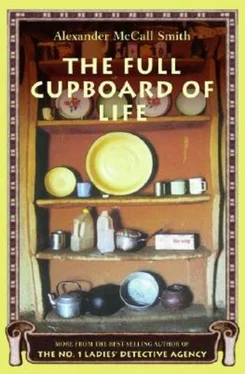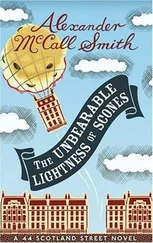Alexander Smith - The Full Cupboard of Life
Здесь есть возможность читать онлайн «Alexander Smith - The Full Cupboard of Life» весь текст электронной книги совершенно бесплатно (целиком полную версию без сокращений). В некоторых случаях можно слушать аудио, скачать через торрент в формате fb2 и присутствует краткое содержание. Жанр: Триллер, на английском языке. Описание произведения, (предисловие) а так же отзывы посетителей доступны на портале библиотеки ЛибКат.
- Название:The Full Cupboard of Life
- Автор:
- Жанр:
- Год:неизвестен
- ISBN:нет данных
- Рейтинг книги:4 / 5. Голосов: 1
-
Избранное:Добавить в избранное
- Отзывы:
-
Ваша оценка:
- 80
- 1
- 2
- 3
- 4
- 5
The Full Cupboard of Life: краткое содержание, описание и аннотация
Предлагаем к чтению аннотацию, описание, краткое содержание или предисловие (зависит от того, что написал сам автор книги «The Full Cupboard of Life»). Если вы не нашли необходимую информацию о книге — напишите в комментариях, мы постараемся отыскать её.
The Full Cupboard of Life — читать онлайн бесплатно полную книгу (весь текст) целиком
Ниже представлен текст книги, разбитый по страницам. Система сохранения места последней прочитанной страницы, позволяет с удобством читать онлайн бесплатно книгу «The Full Cupboard of Life», без необходимости каждый раз заново искать на чём Вы остановились. Поставьте закладку, и сможете в любой момент перейти на страницу, на которой закончили чтение.
Интервал:
Закладка:
Mr Bobologo took out his handkerchief and dabbed again at the side of his mouth.
“I see,” he said. “You have heard of this work that I do.” There was a note of suspicion in his voice, Mma Ramotswe noticed, and she wondered why this should be. Perhaps he was laughed at by others, or labelled a prude, and the thought irritated her. There was nothing to be ashamed of in the work that he did, even if it seemed strange for a man to have such strong views on such a matter. At least he was trying to help address a social problem, which was more than most people did.
“I have heard of it,” said Mma Ramotswe. “And I thought that I would like to hear more about it. It is a good thing that you are doing, Rra.”
Mr Bobologo’s expression remained impassive. Mma Ramotswe thought that he was still unconvinced by what she had said, and so she continued, “The problem of these street girls is a very big one, Rra. Every time I see them going into bars, I think: That girl is somebody’s daughter , and that makes me sad. That is what I think, Rra.”
These words had a marked effect on Mr Bobologo. While she was still speaking, he sat up in his chair, sharply, and stared intensely at Mma Ramotswe.
“You are right, Mma,” he said. “They are all the daughters of some poor person. They are all children who have been loved by their parents, and by God himself, and now where are they? In bars! That is where. Or in the arms of some man. That is also where.” He paused, looking down at the ground. “I am sorry to use such strong language, Mma. I am not a man who uses strong language, but when it comes to this matter, then I am like a dog who has been kicked in the ribs.”
Mma Ramotswe nodded. “It is something that should make us all angry.”
“Yes,” said Mr Bobologo. “It should. It should. But what does the Government do about this? Do you see the Government going down to these bars and chasing these bad girls back to their villages? Do you see that, Mma?”
Mma Ramotswe mused for a moment. There were many things, she thought, that one could reasonably expect the Government to do, but it had never occurred to her that chasing bar girls back to their villages was one of them. For a moment she imagined the Minister of Roads, for example, a portly man who inevitably wore a wide-brimmed hat to shade him from the sun, chasing bar girls down the road to Lobatse, followed, perhaps, by his Under-Secretary and several clerks from the Ministry. It was an intriguing picture, and one which would normally have made her smile, but there was no question of smiling now, in front of the righteous indignation of Mr Bobologo.
“So I decided-together with some friends,” continued Mr Bobologo, “that we should do something ourselves. And that is how we started the House of Hope.”
Mma Ramotswe listened politely as Mr Bobologo listed the difficulties he had encountered in finding a suitable building for the House of Hope and how eventually they had obtained a ruinously expensive lease on a house near the African Mall. It had three bedrooms and a living room which was not enough, he explained, for the fourteen girls who lived there. “Sometimes we have even had as many as twenty bad girls in that place,” he said. “Twenty girls, Mma! All under one roof. When it is that full, then there is not enough room for anybody to do anything. They must sleep on the floor and doubled-up in bunks. That is not a good thing, because when things get that crowded they run away and we have to look for them again and persuade them to come back. It is very trying.”
Mma Ramotswe was intrigued. If the girls ran away, then it implied that they were kept there against their will, which surely could not be the case. You could keep children in one place against their will, but you could not do that to bar girls, if they were over eighteen. There were obviously details of the House of Hope which would require further investigation.
“Would you show me this place, Rra?” she asked. “I can drive you down there in my van if you would show me. Then I will be able to understand the work that you are doing.”
Mr Bobologo seemed to weigh this request for a moment, but then he rose to his feet, taking his glasses off and stowing them in his top pocket. “I am happy to do that, Mma. I am happy for people to see what we are doing so that they may tell other people about it. Perhaps they will even tell the Government and persuade them to give us money so that we can run the House of Hope on a proper basis. There is never ever enough money, and we have to rely on what we can get from churches and some generous people. The Government should pay for this, but do they help us? The answer to that, Mma, is no. The Government is not concerned about the welfare of ladies in this country. They think only of new roads and new buildings. That is what they think of.”
“It is very unfair,” agreed Mma Ramotswe. “I also have a list of things that I think the Government should do.”
“Oh yes?” said Mr Bobologo. “And what is on your list, Mma?”
This question caught Mma Ramotswe by surprise. She had spoken of her list idly, as a conversational ploy; there was no list, really.
“So?” pressed Mr Bobologo. “So what is on this list of yours, Mma?”
Mma Ramotswe thought wildly. “I would like to see boys taught how to sew at school,” she said. “That is on my list.”
Mr Bobologo stared at her. “But that is not possible, Mma,” he said dismissively. “That is not something that boys wish to learn. I am not surprised that the Government is not trying to teach boys this thing. You cannot teach boys to be girls. That is not good for boys.”
“But boys wear clothes, do they not, Rra?” countered Mma Ramotswe. “And if these clothes are torn, then who is there to sew them up?”
“There are girls to do that,” said Mr Bobologo. “There are girls and ladies. There are plenty of people in Botswana to do all the necessary sewing. That is a fact. I am a very experienced teacher and I know about these matters. Do you have anything else on your list, Mma?”
There would have been a time when Mma Ramotswe would not have allowed this to pass, but she was on duty now, and there was no need to antagonise Mr Bobologo. She owed it to her client to find out more about him, and that was a more immediate duty than her duty to the women of Botswana. So she merely looked up at the sky, as if looking for inspiration.
“I would like the Government to do many things,” she said. “But I do not want to make them too tired. So I shall have to think about my list and make it a bit smaller.”
Mr Bobologo looked at her approvingly. “I think that is very wise, Mma. If one asks for too many things at the same time, then one does not usually get them. If you ask for one thing, then you may get that one thing. That is what I have found in life.”
“Ow!” exclaimed Mma Ramotswe. “You are a clever man, Rra!”
Mr Bobologo acknowledged the compliment with a brief nod of the head, and then indicated that he was now ready to follow Mma Ramotswe to the van. She stood aside and invited him to precede her, as was proper when dealing with a teacher. Whatever Mr Bobologo might prove to be like, he was first and foremost a teacher, and Mma Ramotswe believed very strongly that teachers should be treated with respect, as they always had been before the old Botswana morality had started to unravel. Now people treated teachers like anybody else, which was a grave mistake; no wonder children were so cheeky and ill-behaved. A society that undermined its teachers and their authority only dug away at its own sure foundations. Mma Ramotswe thought this was obvious; the astonishing thing was that many people simply did not understand that this was the case. But there was a great deal that people did not understand and would only learn through bitter experience. In her view, one of these things was the truth of the old African saying that it takes an entire village to raise a child. Of course it does; of course it does. Everybody in a village had a role to play in bringing up a child-and cherishing it-and in return that child would in due course feel responsible for everybody in that village. That is what makes life in society possible. We must love one another and help one another in our daily lives. That was the traditional African way and there was no substitute for it. None.
Читать дальшеИнтервал:
Закладка:
Похожие книги на «The Full Cupboard of Life»
Представляем Вашему вниманию похожие книги на «The Full Cupboard of Life» списком для выбора. Мы отобрали схожую по названию и смыслу литературу в надежде предоставить читателям больше вариантов отыскать новые, интересные, ещё непрочитанные произведения.
Обсуждение, отзывы о книге «The Full Cupboard of Life» и просто собственные мнения читателей. Оставьте ваши комментарии, напишите, что Вы думаете о произведении, его смысле или главных героях. Укажите что конкретно понравилось, а что нет, и почему Вы так считаете.












